Report "Megamind" from the conference TEDx Moscow
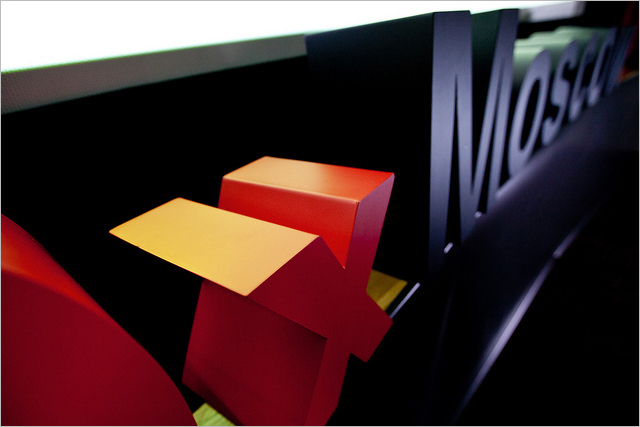
On Sunday, the next TEDxMoscow took place at the Metropol Hotel in Moscow.
When I began to describe my own impressions and feelings from this event, it became clear that it was necessary to delve not only and not so much into the individual reports sounded from the stage, but into what TED is. Why and for whom has it existed for many years?
What is TED
Probably, most interested users know the TED abbreviation: Technology Entertainment Design. As well as the main motto of each event held under the auspices of the TED: "Ideas Worth Spreading" (ideas worthy of distribution).
Few people know how it all began. But the story of the people responsible for this recognizable brand began long before the first annual TED conference, held in Monterey (California) in 1984. So first, a couple of words about Chris Anderson, TED's permanent curator and Richard Sole Wurmen - the architect who started the “just complicated” format.
')
Chris Anderson is a person who can be seen and heard with an opening statement at the beginning of each annual TED conference. His biography is replete with interesting details: he was born in Pakistan, spent his childhood in India and Afghanistan, got his secondary education in England, and there he graduated from the University of Oxford with a degree in Philosophy, Politics and Economics.
Chris soon became interested in journalism: he participated in the work of a pirate radio station in the Seychelles, in 1985 he opened publishing house Future Plc with his own money, which exists and is actively developing to this day. After moving to San Francisco in 1994, Chris continued to do what he loved until 2001, when he left the company to devote all his time to TED. Also in 2001, the company with the rights to the conference was acquired by the non-profit foundation The Sapling Foundation, also founded by Chris. He defined the main mission as “Ideas worth spreading.”
Since then, ideas have not ceased to spread.
And yet, the person who made TED exactly that way was called differently. Richard Saul Wurman , graphic designer and architect, is the second founder of TED. In the process of studying information related to the phenomenon of the conference devoted to absolutely everything, it seemed to me that his personality played a much greater role in the development of the TED brand.
At the age of 26 years (1962), Richard published his first book, Cities: A Comparison of Form and Scale, which determined his future path in life, namely, to make all the information understandable to himself and to all other interested people. It was Richard Wurman who began using the conference format to research and expand ideas. He chaired the international design conference in Aspen in 1972, the first Federal Design Meeting in 1973, and the American Institute of Architects Convention in 1976.
Richard is the author of the term "information architecture", which was originally just the approach used in his series of guides to cities in the world and their surroundings. The methods and principles of Richard are outlined in the book Information Anxiety , released in 1989 and reprinted in 2000.
It was Richard Saul Wurman who founded and led TED in 1984 by selling the rights to host the conference in 2001 to Chris Anderson, while always remaining invisibly nearby and shaping the agenda that TED brings to the masses today.

TEDxMoscow
So back in our day. TED has been successfully operating for more than twenty years now, during which time several TED Prize awards have been awarded, the wording of which has not changed since 2005 for “the desire to change the world.”
In addition, it is expected that such a popular way to disseminate valuable information will be overgrown with additional activities. After all, people with unique ideas are all over the world from Baghdad to San Francisco - it is logical that they, too, will want to share their own knowledge in their usual language. This is the story of TEDx.
Independent TED-style conferences held locally: among groups of people, in cities, countries, individual universities, and so on, are in fact the easiest way to independently see and hear all the ideas from their direct carriers or, if you like, “carriers”.
Here you should write separately that “Russian TEDx” already has a certain tradition and many venues. Since 2009, in many cities of Russia, and not only in Moscow or St. Petersburg, dozens of events have been held on specific topics.
It was on such an event that I was lucky enough to visit this past Sunday.
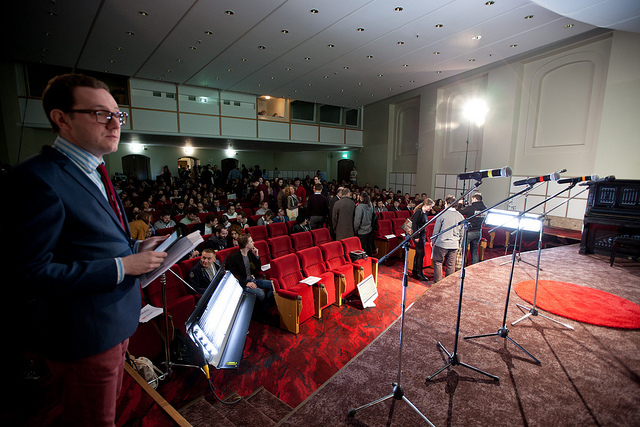
"And the possible is possible"
You should not laugh at the theme of the event, which looks somewhat "obvious." And I had such an impression before I heard the first report at the event itself. The “possible”, that is, what surrounds us every day and every minute, became so thanks to someone's efforts and aspirations. Why was this possible and impossible? How the borders of the possible today are moving apart - this is exactly what most of the reports presented in the hall of the Metropol Hotel were devoted to.
I will talk briefly about each of the reports separately, and you yourself decide to watch something specific, or the whole event.
Peter Nalitch
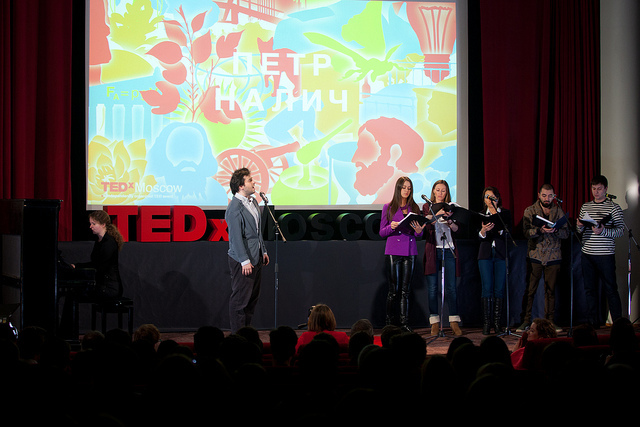
Famous musician Peter Nalich dedicated his report to how you can sing songs that have no meaning from a linguistic point of view, along the way he told why this art turned out to be forgotten today.
Dmitry Alekseev
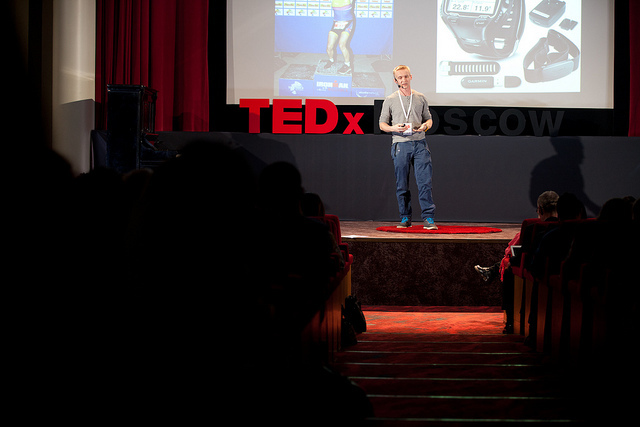
Dmitry took his 18 minutes to a lecture on the “microbiota” - the population of our intestines, bacteria and microorganisms, which can both help us exist and be serious obstacles.
Rob Strevelaar
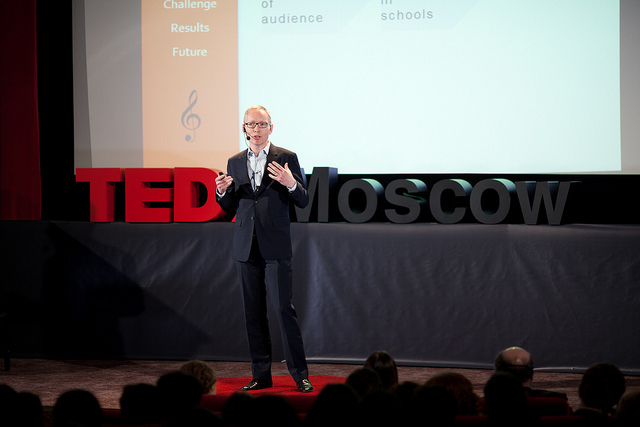
Rob was the only speaker who spoke not English, but English. His report is devoted to the innovative work with music and society, which is engaged in the Amsterdam Philharmonic Orchestra under his command.
Alexander Privalov

Scientific editor of Expert magazine - Alexander, was one of the wisest and most experienced speakers. And he touched a difficult topic - the celebration of Victory Day on May 9 in the past and present.
Ivan Konstantinov

But Ivan, the head of Visual Science Studio, received a standing ovation and approval from the hall, telling why he and his team began to visualize information about viruses. Surely, many of you have seen examples of the work of Ivan’s studio, which were awarded the prize of the journal Science.
Julia Shakhnovskaya

The story of the general director of the Moscow Polytechnic Museum was devoted to how she and her team create a museum that should become the best in the world. It is good to know that among us there are people who are so zealously striving for perfection.
Vladimir Dolgiy-Rapoport
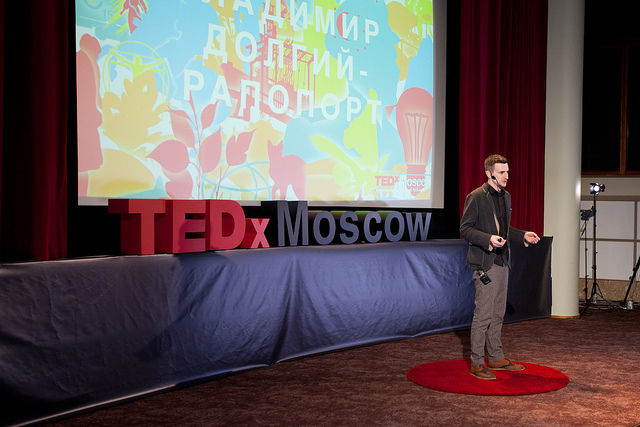
Vladimir shared his own ideas and practices about teaching children to sport on the example of his own project with great prospects.
Yegor Prohorchuk

The head of the laboratory of genomics and epigenomics of vertebrates from the Bioengineering Center of the Russian Academy of Sciences told about how and why people are “read” today.
Elena Serova
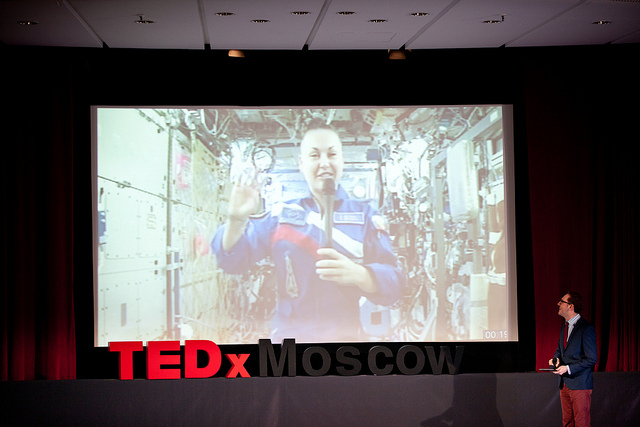
Finally, the very moment came that many were waiting for - a live broadcast from the Roskosmos Flight Control Center for direct communication with Elena Serova, who is now in orbit as part of the next ISS mission. Elena spoke about the training of astronauts and their life in space.
Sergey Besov
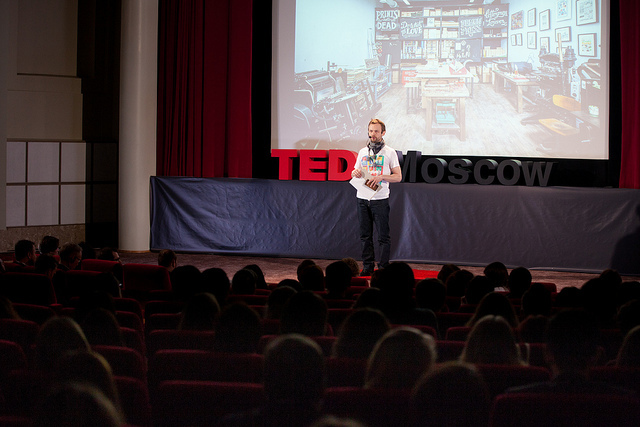
Co-founder of the workshop "Demons of the press" Sergei Besov talked about the "letterpress". This is an old technology that Gutenberg worked with, but still exists today.
Svetlana Emelyanova
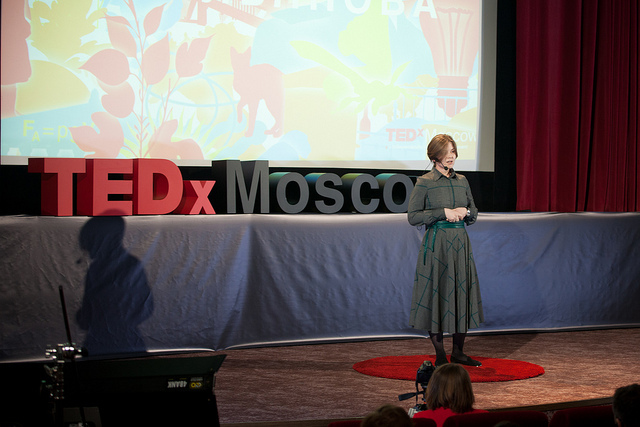
Sister of Mercy Svetlana shared a difficult experience of helping children with their own experiences, as well as from stories of people close to her.
Sergey Krasin

The founder of FancyMusic, Sergey Krasin, is a financier by education, told his own story about how a hobby turned out to be what he is doing 24x7 today.
Many thanks to the organizers of TEDxMoscow for inviting Megamind. We hope that we can come, see and listen to the following lectures from interesting specialists from all areas in their native Russian. Share worthwhile ideas!
Source: https://habr.com/ru/post/285990/
All Articles